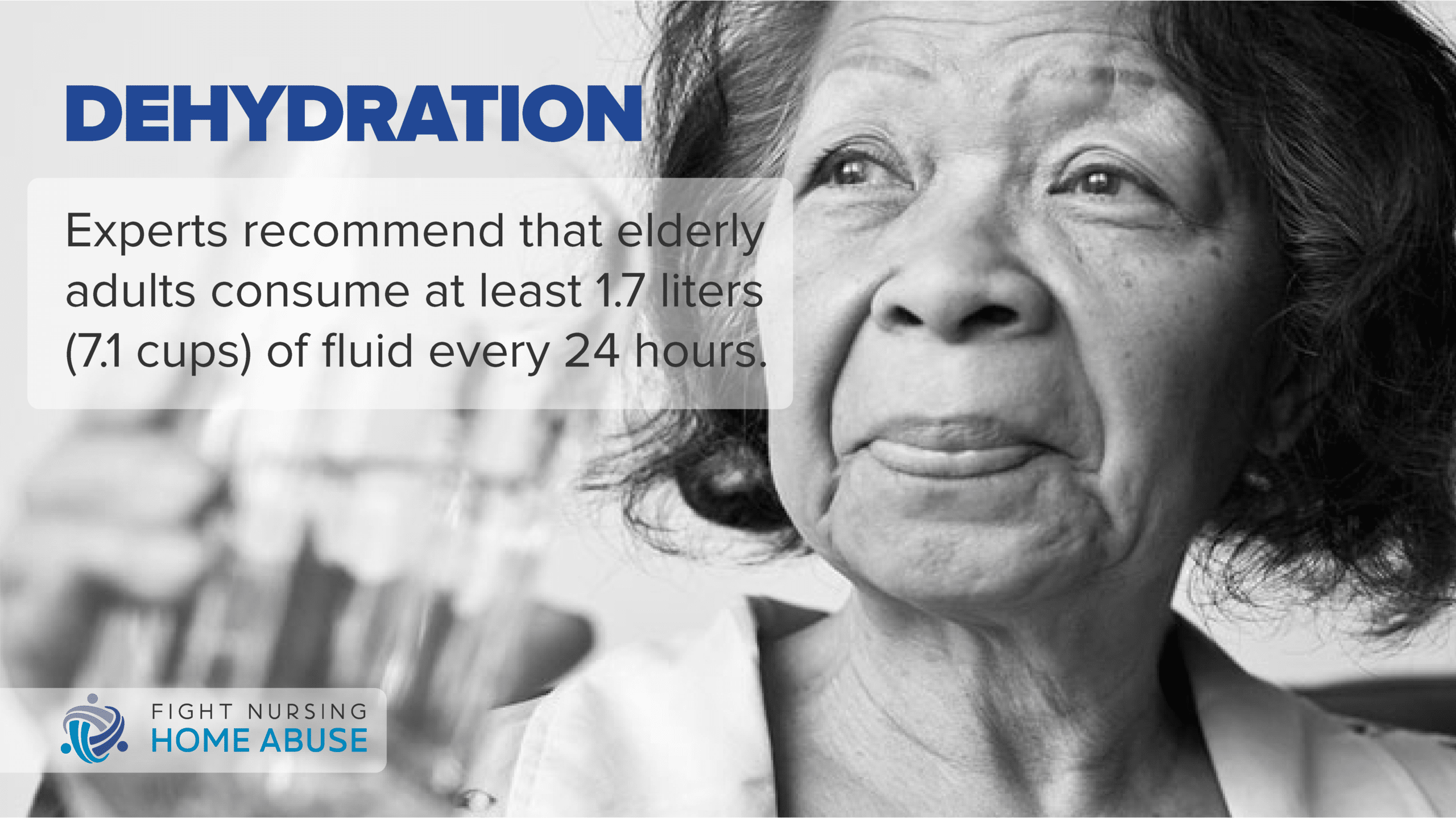Dehydration

In nursing homes, caregivers have the responsibility of making sure that residents are provided with adequate hydration. Dehydration can be particularly dangerous for older adults, so this is an important part of daily care. Failing to provide residents with adequate hydration and assisting them with hydration when needed is a form of neglect.
Injuries and illnesses caused by dehydration in nursing homes are largely preventable. Sadly, dehydration among nursing home residents is a chronic problem. Read on to learn more.
What is Dehydration?
Dehydration is defined as an excessive loss of body fluid. That means that the body loses more fluid than it takes in. When that happens, the body cannot perform as well as it should. The human body requires a certain amount of fluids in order to work at full capacity.
Dehydration can be caused from fluid loss due to illnesses, medication side effects and/or a decrease of fluids intake. For elderly people, physiological changes may also play a part in dehydration. For example, older people are often unable to concentrate urine from the kidneys.
The most common causes of dehydration are:
- Diarrhea
- Vomiting
- Fever
- Excessive sweating
- Increase in urine output
In nursing homes, dehydration most often occurs from neglect when staff members either forget or refuse to provide enough fluids. Studies show that nursing home residents are particularly vulnerable to dehydration because many of them cannot get their own drinks, and others are unable to voice their need for hydration.

Staff members must always be diligent as dehydration can happen quickly. Caregivers must provide access to adequate hydration, including helping residents drink. They must also monitor residents for signs of dehydration
What are the Symptoms of Dehydration?
Once dehydration sets in, residents are at risk for several other medical problems, including a weakened immune system, worsened dementia, bedsores, ulcers, electrolyte imbalances, pneumonia and a higher rate of developing infections.
It is important that caregivers and family members recognize the symptoms of dehydration. Dehydration signs and symptoms to look for include:
- Excessive or nagging thirst
- Loss of appetite
- Dry skin
- Skin flushing (red in the face)
- Dark colored urine
- Dry mouth
- Fatigue
- Weakness
- Chills
- Dizziness, faintness or lightheadedness
These are the most common symptoms of early dehydration. More severe dehydration may cause more serious symptoms, such as:
- Vomiting
- Heavy breathing (panting)
- Lack of sweating
- Disorientation
- Low blood pressure
- Hallucinations
- Delirium
Any of these symptoms indicate severe dehydration and are a medical emergency. Nursing home residents who reach this point of dehydration are at risk for kidney or urinary problems, seizures, heat injuries, hypovolemic shock or even death.
How Can Dehydration be Prevented?
Preventing dehydration begins with a healthy diet and plenty of fluids. The body gets hydration from drinking fluids and eating fruits and vegetables that are high in water content. For most people, the feeling of thirst is a good simple indicator that you need something to drink.
For older adults, however, illnesses and medications can make it difficult to ascertain real thirst from symptoms like dry mouth. Many older adults also need assistance with eating and drinking, which makes them particularly vulnerable to dehydration.
Diagnosis and Treatment
A doctor can generally diagnose dehydration based on physical symptoms like low blood pressure. To confirm the diagnosis, a doctor will perform a blood test and urinalysis.
- Blood tests: Blood samples are collected to measure electrolytes (potassium and sodium) and kidney function.
- Urinalysis: Urine is collected to measure dehydration and check for signs of infection, such as a bladder infection.
Based on the results of these tests, your doctor will recommend a course of treatment. The only effective way to treat dehydration is to replace the lost fluids and electrolytes. People with mild dehydration should drink extra fluids, such as water or an oral rehydration solution (think Pedialyte). People with severe dehydration may need intravenous (IV) fluids, such as water and salt. This is a quicker way of getting fluids to the body.
What is the Prognosis for Dehydration?
When the underlying cause is identified and treated, most adults recover from dehydration without incident. This prognosis depends on a variety of factors including the person’s overall health, the underlying cause of dehydration and how well they respond to treatment.
If complications develop, the prognosis may not be as favorable. For example, people who develop swelling in the brain, seizures, shock or kidney failure may have a more difficult recovery. In severe cases, these complications of dehydration are life-threatening.


